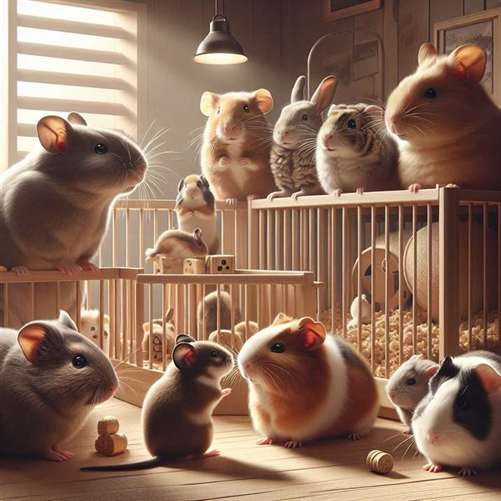Socializing Small Pet Mammals: A Complete Guide
Introduction
If you’ve ever considered bringing a small mammal into your home, you might be wondering how to ensure they are well-adjusted and sociable. Socializing small pet mammals is a topic that has gained traction among pet owners and enthusiasts alike. Understanding how to socialize these adorable creatures can enhance their quality of life and strengthen the bond between you and your furry friend.
Why Socialization Matters
Socializing your small pet mammals is not just about making them cute companions; it’s crucial for their mental health and overall well-being. A well-socialized pet is often happier, more active, and less prone to behavioral issues. The importance of this practice has become increasingly evident, especially as more families choose small pets for their homes. According to recent studies, pets that receive adequate socialization enjoy a more fulfilling life, making them better companions for families, especially those with children.
In this guide, we will explore everything you need to know about socializing small pet mammals. We’ll cover:
- What socialization means for small mammals
- The historical context and importance of socializing small pet mammals
- Practical tips and techniques for effective socialization
- Common challenges and solutions
- The future of socializing small pet mammals
So, whether you’re a new pet owner or looking to improve your pet’s social skills, this article will provide you with invaluable insights and actionable steps.
What to Expect
By the end of this guide, you’ll not only understand the concept of socializing small pet mammals but also how to implement effective strategies to ensure your pets thrive in a social environment. Let’s dive into the world of small mammals and discover how to make their lives—and yours—much more enriching!
What is Socializing Small Pet Mammals?
Definition
Socializing small pet mammals refers to the process of helping these pets interact positively with humans and other animals. It involves a range of activities and experiences that promote a sense of safety, comfort, and trust. The goal is to create a well-rounded pet that can handle various environments and social settings without fear or aggression.
Historical Context
The practice of socializing pets isn’t new; it has roots that trace back to ancient civilizations. Historically, small mammals like rabbits and guinea pigs were seen as food sources or simple companions. However, as our understanding of animal behavior evolved, the focus shifted to their welfare and the importance of social interaction.
During the late 20th century, pet ownership began to change dramatically. The rise of the pet industry, coupled with a growing awareness of animal rights, led to increased emphasis on pet behavior and socialization. Today, pet owners are more educated about the needs of their small mammals, recognizing that socialization is key to a happy, healthy pet.
The Importance of Socializing Small Pet Mammals
In recent years, the significance of socializing small pet mammals has become more pronounced due to several factors:
- Increased Pet Ownership: With more families adopting small pets, understanding their social needs is crucial.
- Awareness of Animal Welfare: There is a growing recognition that pets are sentient beings deserving of mental and emotional care.
- Behavioral Challenges: Poorly socialized pets often exhibit anxiety, aggression, and other behavioral issues, which can lead to frustration for owners.
Socializing small pet mammals not only enhances their lives but also enriches the experience for pet owners. A well-socialized pet can integrate smoothly into family life, reducing stress for both the pet and the owner.
Socializing Small Pet Mammals in the Context of Pet Ownership
As part of responsible pet ownership, socializing small mammals is essential. It impacts how these pets interact with people, other pets, and their environment. A pet that is not socialized may become anxious or aggressive, making it harder for them to adapt to new situations.
Key Players or Contributors
Numerous organizations and individuals advocate for the proper socialization of small mammals. Veterinarians, animal behaviorists, and pet care experts contribute valuable insights and resources. Additionally, various pet care blogs and forums serve as platforms for sharing tips and experiences, fostering a community dedicated to enhancing the lives of small pets.

Benefits of Socializing Small Pet Mammals
Socializing small pet mammals comes with a multitude of benefits, both for the pets themselves and their owners. Here’s a closer look at some of the key advantages:
Improved Behavior
- Reduced Aggression: Socialized pets are less likely to display aggressive behaviors towards humans or other animals.
- Less Fearful: Proper socialization helps pets cope with new experiences and environments, reducing anxiety.
Enhanced Bonding
- Stronger Relationships: Regular interaction fosters trust and affection between pets and their owners.
- Fun Interactions: Socialized pets are typically more playful and engaging, making playtime more enjoyable for everyone involved.
Healthier Lifestyle
- Physical Activity: Socialized pets are often more active, leading to better physical health.
- Mental Stimulation: Interacting with various stimuli—people, other animals, and different environments—keeps their minds sharp.
Greater Adaptability
- Easier Travel: Pets that are used to socialization are more likely to adapt well during travel or visits to new places.
- Better Handling: Socialized pets are easier to handle during vet visits or grooming sessions, reducing stress for both pet and owner.
How to Socialize Small Pet Mammals
Now that you understand the importance of socializing small pet mammals, let’s delve into practical methods to achieve this. Here are some effective strategies to help you get started:
Start Early
The earlier you begin socialization, the better. Young small mammals are more adaptable and open to new experiences. Aim to introduce them to various sights, sounds, and people during their formative weeks.
Gradual Introduction
- One Step at a Time: Introduce your pet to new experiences gradually. Start with familiar environments before progressing to more challenging situations.
- Controlled Exposure: Use a controlled environment to expose your pet to new people or animals, ensuring they feel safe.
Positive Reinforcement
- Rewards: Use treats and praise to reward your pet for calm behavior during socialization experiences. This will encourage them to associate new experiences with positive outcomes.
- Consistency: Be consistent with your training and reinforcement strategies to foster a sense of security in your pet.
Create a Safe Space
- Comfort Zone: Ensure your pet has a safe space where they can retreat if they feel overwhelmed. This could be a cozy corner in the room or a designated area in their cage.
- Familiar Items: Include familiar toys or bedding in their safe space to help them feel secure during new experiences.
Socialization Techniques
- Playdates: Arrange playdates with other pets to help your small mammal learn appropriate social behaviors.
- Family Interaction: Encourage family members to interact with your pet, helping them become accustomed to different people and handling styles.
- Public Outings: If your pet is comfortable, take them on short outings to pet-friendly places like parks or pet stores, where they can experience new sights and sounds.
Common Challenges in Socializing Small Pet Mammals
While socializing small pet mammals is beneficial, it can also present challenges. Here are some common issues you might encounter and tips on how to overcome them:
Fear and Anxiety
- Signs of Fear: Watch for signs of fear, such as hiding, trembling, or aggressive behavior. If your pet shows these signs, scale back on socialization efforts and take a slower approach.
- Desensitization: Gradually expose your pet to the source of their fear in controlled settings to help them become more comfortable.
Dominance Issues
- Understanding Hierarchy: In multi-pet households, some pets may exhibit dominance behaviors. Monitor interactions and intervene if necessary to prevent conflicts.
- Training: Consider basic training techniques to reinforce positive behaviors and establish a cooperative environment.
Lack of Interest
- Boredom: If your pet seems uninterested in socialization activities, introduce new toys or play techniques to reignite their curiosity.
- Variety: Change up the socialization routine to keep things fresh and engaging for your pet.
Future Trends in Socializing Small Pet Mammals
As society continues to evolve, so do our approaches to pet care and socialization. Here are some emerging trends that are shaping the future of socializing small pet mammals:
Increased Use of Technology
- Apps and Resources: With the rise of pet care apps, owners can access a wealth of information on socialization techniques and training methods.
- Virtual Socialization: Some pet owners are exploring virtual playdates or training sessions, allowing pets to interact with others in a controlled environment.
Community Engagement
- Pet Meetups: More communities are organizing pet meetups, providing opportunities for small mammals to interact with each other in safe settings.
- Educational Workshops: Local pet stores and veterinary clinics are increasingly hosting workshops focused on socializing small mammals, providing hands-on training for pet owners.
Holistic Approaches
- Wellness Focus: As awareness of animal welfare grows, pet owners are adopting holistic approaches to care that include socialization as a key component of overall health.
Conclusion
Understanding socializing small pet mammals is vital for any pet owner looking to enhance
Resource Links:
- petmd.com: … These pets are generally called African pygmy hedgehogs. With the right enclosure and environment, these animals can thrive and be fun, social …
- reddit.com: … For cheaper rodents, I would go with a Dumbo Rat. They’re … pet can socialize with you get 2 rats… when you go to pick them out …
- lazy5vets.com: … The Importance of Socializing Puppies to Guide Them to Being an Emotionally Healthy Adult … small dog in. My older dog Dobby is very cute and …




0 Comments